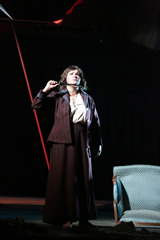| Opera Reviews | 27 April 2024 |
Chailly makes a strong case for Giovanna d'Arcoby Silvia Luraghi |
|
| Verdi: Giovanna d'Arco Teatro alla Scala, Milan 10 December 2015 |
|
|
The performance enjoyed a great success, and one would have had the feeling that everything had gone perfectly, if the internet streaming from the backstage had not captured one of the stage directors addressing a bilingual insult to the conductor immediately after the end. Reportedly, the differences between the conductor and stage directors Moshe Leiser and Patrice Caurier had been growing during the rehearsals, with Chailly never addressing the two directly. In spite of this, the final result was very compelling, from all points of view, as could also be appreciated in the worldwide telecast. At the second performance, in a more relaxed atmosphere, the house was packed, and the audience proved at least as enthusiastic as at opening night. A large part of the merits for making this lesser known and seldom performed opera appealing certainly goes to the conductor. Chailly conducted with great care, sharing his deep knowledge of Verdi’s music with the orchestra, which reacted outstandingly. Superstar Anna Netrebko was a superb Giovanna: her perfect technique allows her to master, apparently effortlessly, the tessitura of the role and to concentrate on her vocal and theatrical interpretation, which she did with great temperamento. At her side, Francesco Meli as king Carlo VII, with his sizable and perfectly tuned tenor, displayed a wide palette of colors which did justice to the somewhat awkward (when compared to Giovanna) character. The planned cast featured baritone Carlos Álvarez in the role of Giovanna’s father Giacomo, but the singer became indisposed during the rehearsals, and by the time of the final dress it was clear that he would have had to cancel at least the first three performances. His place was taken by Devid Cecconi, who did his best in spite of not having rehearsed on stage. A special mention is deserved for the chorus, who play an important part in this opera, both musically and theatrically. The basic weakness of Giovanna d’Arco lies in Temistocle Solera’s libretto, which does not allow for a full psychological development of the characters, and makes the director’s work quite hard. Moshe Leiser and Patrice Caurier, who took up the challenge with the help of set designer Christian Fenouillat, costumer Agostino Cavalca, light designer Christophe Forey, and video director Etienne Guiol, took as their starting point the only well worked out aspect of the libretto, that is, Giovanna’s hallucinations, and offered a view of the whole action as taking place in the girl’s vivid imagination. During the overture, the curtain rises on Giovanna’s bedroom, where the disconsolate father tries to help his daughter find some peace. Then the curtain falls (or at least it should, but at the second performance it remained hanging halfway down due to some technical problem), and when it rises again the audience is brought inside Giovanna’s visions. Accordingly, Carlo looks like how a fanciful teenager would imagine a king, completely covered with gold; the virgin Mary in the forest is a small Madonna placed in the girl’s bedroom, and the walls of the room, with the help of the lights and video projected on the upper part of the stage turn into a battlefield. At the end of the second act, Giovanna and Carlo are surrounded by red dressed demons with horns and hoofs, just as the devil is depicted in popular tales. The chorus surrounds principals at various moments, thus serving as a moving set. Giovanna in the dungeon imagines herself as being burning at the stake, until her father frees her, and she can wear her armor again for the final battle. When she returns wounded, Carlo rises from the stage on a golden horse, just to be swallowed again as Giovanna dies, and the final curtain falls. Both opening night and the second performance were met with appreciation by the audience, with enthusiastic bravos for Netrebko, Meli, and Chailly.
|
|
| Text ©
Silvia Luraghi Photo © Teatro alla Scala |

 After 150 years’ absence, Giuseppe Verdi’s early opera Giovanna d’Arco returned to La Scala as the 2015-16 season opener, marking the start of Riccardo Chailly’s tenure as the company’s principal music director. This year’s opening night was also the first time for veterans and newcomers to pass through enhanced security measures, with metal detectors and numerous members of the security corps in the concourse.
After 150 years’ absence, Giuseppe Verdi’s early opera Giovanna d’Arco returned to La Scala as the 2015-16 season opener, marking the start of Riccardo Chailly’s tenure as the company’s principal music director. This year’s opening night was also the first time for veterans and newcomers to pass through enhanced security measures, with metal detectors and numerous members of the security corps in the concourse. 





